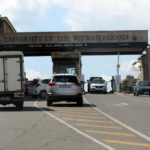Johannesburg – South Africa has taken a firm stance, declaring that it will no longer welcome charter flights carrying Palestinians into the country. This decision follows the recent arrival of planes transporting families from Gaza, an event that has sparked a government investigation and raised serious concerns about potential human trafficking and a broader agenda to displace Palestinians from their homeland.
The catalyst for this decisive action was the arrival of a chartered flight from Kenya last Thursday, carrying 153 Palestinians. Upon landing at OR Tambo International Airport, the group was initially denied entry due to incomplete documentation. Crucially, they lacked exit stamps from Israel, return tickets, and confirmed accommodation details. After a tense 12-hour wait at the airport, local aid organisations intervened, and the travellers were eventually granted entry under South Africa’s 90-day visa exemption for humanitarian cases.
However, this seemingly compassionate resolution has given way to deep suspicion within the South African government. Minister of International Relations and Cooperation, Ronald Lamola, provided an update from Johannesburg, confirming that a full government investigation is now underway.
“The Palestinian plane – as to whether there is some shady work and so forth – indeed, we are suspicious as the South African government about the circumstances surrounding the arrival of the plane and the passengers that were in it,” Lamola stated. He emphasised the gravity of the situation, adding, “This matter is under investigation, and the South African public will know the outcome in due course. It is indeed an issue of concern to us."
Lamola went on to articulate the government's growing apprehension that these flights are not isolated incidents, but rather part of a larger, orchestrated effort. "It does look like it represents a broader agenda to remove Palestinians from Palestine to many different parts of the world," he warned. "It’s a clearly orchestrated operation because they are not only being sent to South Africa – there are other countries where such flights have been sent."
The Minister made it clear that South Africa would not be complicit in any such scheme. "We do not want any further flights to come our way because this appears to be a clear agenda to cleanse Palestinians out of Gaza, the West Bank, and other areas, which South Africa strongly opposes.”
Adding another layer of complexity to the situation, IOL has learned that South Africa’s government and intelligence services have launched a joint probe into the arrival of the 153 travellers. Investigators are meticulously examining whether the movement was coordinated by a shadowy organisation known as Al-Majd Europe, which allegedly arranged the travel. Authorities suspect that this operation may be part of a wider campaign of “forced migration” involving vulnerable Palestinians being relocated to multiple destinations.
While this particular flight has garnered significant attention, it was not the first of its kind to originate from Israel. The fact that the 153 Palestinians arrived without the correct documentation raised immediate red flags. Given the stringent border controls imposed by Israel – and on the Palestinian territory that passengers had to transit to reach the Israeli airport – South African authorities struggled to understand how the plane had been permitted to depart in the first place.
The spotlight has now turned to Al-Majd Europe, the organisation purportedly responsible for arranging the Palestinians' travel. On its website, Al-Majd claims to arrange "humanitarian evacuation." However, activists have been voicing concerns about flights organised by Al-Majd Europe since the summer.
Adding to the intrigue, Al-Majd claims to have been founded in Germany in 2010 and is now located in Jerusalem. However, investigations have revealed that no such company or charity exists in German registries, and Israeli researchers have confirmed the same is true in Israel. The organisation's website employs questionable tactics, using images of individuals from other crisis situations and falsely presenting them as its own. Furthermore, the website’s IP address is hidden by privacy software, masking its true location.
Financial transparency is another area of concern. The "donate" button on the Al-Majd website is non-functional. Research using Bitcoin trackers indicates that Al-Majd has only ever received approximately $106 (€91) worth of cryptocurrency via the Bitcoin account it lists for donations, despite claiming to rely on donations to assist those in need. Palestinian passengers who travelled to South Africa with Al-Majd reported paying between $1,500 and $2,000, but these payments were allegedly directed to personal accounts. An enquiry sent to the email address listed on Al-Majd's website went unanswered.
Further investigation by the Israeli newspaper Haaretz has uncovered additional anomalies, including a connection between Al-Majd and Tomer Jamar Lind, an individual with dual Israeli-Estonian citizenship based in London. Attempts to contact Lind for comment have been unsuccessful.
Adding another layer of complexity, the air charter companies involved in transporting the Palestinians to South Africa – Fly Yo, based in Romania, and Kibris Turkish Airlines, based in Cyprus – are both Israeli-owned.
These factors have fuelled speculation among activists, South African politicians, and the media that Al-Majd may be part of a broader plan to transfer Palestinians out of Gaza. Tania Hary, executive director at Gisha, an Israeli non-profit advocating for Palestinian freedom of movement, expressed her deep concern: "The reports about people being flown to sometimes unknown destinations by Al-Majd are deeply troubling. It appears that this questionable private entity is taking advantage of people's desperation and beginning to quietly fulfil Israel's vision for transfer of Palestinians."
The idea of relocating Palestinians from Gaza is not new. In February 2025, then US President Donald Trump spoke about his "Gaza Riviera" plan, which would have required moving locals out of Gaza to third countries. Coincidentally, in the same month, Al-Majd began advertising its services to Palestinians on social media. In March, the Israeli government announced the creation of a "directorate of voluntary emigration" within its Ministry of Defense.
Israeli rights groups raised concerns about this directorate at the time and claim they still lack comprehensive information about its activities. Gisha director Hary asserts that a policy of "voluntary emigration" from Gaza is supported by senior Israeli politicians and that Israeli intelligence agencies previously sent text messages to Gaza residents "inviting them to explore departure options."
When questioned about any connections to Al-Majd Europe, the Israeli Ministry of Defense did not provide a response.
Despite the mounting suspicion, a man named Omar, whose number is listed on Al-Majd's website, maintains that the organisation's intentions are purely humanitarian. In a WhatsApp interview, Omar, who identified himself as a Palestinian living in Jerusalem but declined to provide his last name for security reasons, dismissed speculation about Al-Majd's connections to the Israeli government. He claimed that such rumours were being spread by Hamas and the Palestinian Authority, implying that these groups oppose the departure of people from Gaza.
Omar also stated that Al-Majd had to liaise with Israel's Coordinator of Government Activities in the Territories (COGAT), which manages Israel's official business in Gaza and is part of Israel's defense ministry, to facilitate the movement of people out of Gaza and to the airport in Israel.
"I'm helping my people in Gaza, and this isn't emigration," Omar insisted. "I'm helping people who want to live, not die inside Gaza."
However, Omar declined to answer further questions regarding connections to Lind, how he established contact with international, Israeli-owned charter companies, why the links on Al-Majd's website are non-functional, or the organisation's finances. He also claimed to "couldn't remember" how many Palestinians had left Gaza with Al Majd.
Therefore, it remains unclear whether Al-Majd is connected to the Israeli government, whether it is a private initiative supporting government policies, or simply a money-making venture.
Regardless of Al-Majd's true motives, it is undeniable that Israeli security forces would have had to cooperate with the charter flights departing the country.
Israel has imposed restrictions on Palestinians' freedom of movement since 1967, when it occupied the Palestinian Territories. These restrictions have varied depending on the level of tensions between Israel and Palestinian militant groups. Prior to the current conflict, travel out of Gaza was permitted for work, medical treatment, or in "exceptional humanitarian cases," such as weddings or funerals of immediate family members.
Since the Hamas attack on Israel on October 7, 2023, and the subsequent Israeli blockade of Gaza, it has become even more difficult to leave the coastal enclave. However, reports in Israeli media suggest that departures have become easier since the announcement of the "directorate of voluntary emigration."
Official figures on the number of Palestinians who have left Gaza are unavailable.
The World Health Organization has organised 2,589 medical evacuations this year, with 5,000 companions. It is also estimated that over 100,000 Palestinians travelled to Egypt in early 2024. However, according to a report in the Times of Israel in May this year, departures have decreased since then.
The issue of Palestinians leaving Gaza, even under the current circumstances, is highly sensitive.
Omar Shakir, Israel and Palestine director at Human Rights Watch, emphasised the importance of international law: "Under international law, every person has the right to live in their country in safety and dignity, to leave for their own security or any other reason and to return to it. The challenge in the Israeli-Palestinian context is that the Israeli government has a decades-long track record of blocking Palestinian refugees from their right to return home."
A survey conducted in May by the Palestinian Center for Policy and Survey Research revealed that approximately half of Palestinians in the occupied territories would be willing to apply to emigrate, compared to around 25% before the current conflict. Al-Majd Europe's posts on TikTok have attracted hundreds of comments from desperate Palestinians.
Gisha director Hary argues that "Under today's devastating conditions in Gaza, any such 'encouragement' cannot amount to free choice. All the more so as Israel refuses to guarantee that people who leave will be allowed to return. Taken together, the unlivable conditions and the official promotion of 'voluntary departure' reflect a pattern of forced transfer disguised as free choice."
Under international law, the forcible transfer of a population constitutes a crime against humanity. Rights Watch's Shakir agrees that there is nothing voluntary about Palestinians leaving Gaza.
"The critical context here is that the Israeli government has pursued a policy to deliberately make Gaza unlivable," he concluded, "and the ceasefire has not changed that reality."

Follow Us on Twitter











